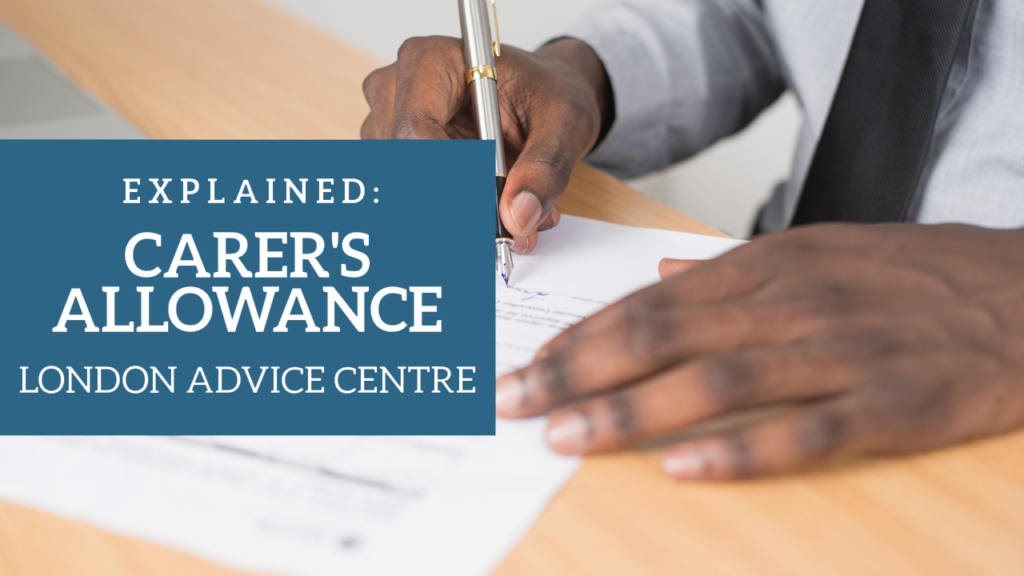
Carer’s Allowance is a benefit available to those who care for someone for at least 35 hours a week. If you care for more than one person, you will not eligible for a higher sum. And if a person has multiple carers only one person can claim. It does not count towards the benefit cap (a limit to how much benefit you can get) but may affect your other benefit payments, however, the total amount you receive will normally go up or stay the same.
If the person you are caring for is also caring for someone else, you can both claim Carer’s Allowance as you are caring for different people and both meet the criteria. This can include caring for each other.
Eligibility
For you
- Over 16
There is no upper limit age limit to this benefit but it normally stops when you claim State Pension as you can’t have both due to them being overlapping benefits. Exceptions are made if your State Pension is less than what you’re entitle to for Carer’s Allowance. In these cases you could be eligible for a small amount of Carer’s Allowance.
- Spend at least 35 hours a week caring for someone (day or night)
Care can include practical household tasks and activities such as cooking, washing, shopping etc. Practical tasks whilst not in their presence such as preparation (preparing before visiting and cleaning after) etc., and travel (to a doctor’s appointment, hospital regularly).
- You earn £128 a week or less (after all taxes)
If you occasionally earn more than this a week, your average earnings will be used to work out if you’re still eligible.
- You are habitually resident in England, Scotland or Wales and have lived here for 2 of the last 3 years
- Not a student/in full-time education or studying for 21 hours or more weekly
- Not subject to immigration control
You don’t have to be related or live with the person you care for.
For the person you care for
They must be receiving at least one of these benefits
- Personal Independence Payment (PIP)
- Disability Living Allowance
- Attendance Allowance
- Constant Attendance Allowance
At or above normal maximum with Industrial Injuries Disablement Payment or basic (full day) rate with War Disablement Pension
- Armed Forced Independence Payment
Always check with the person you’re caring for before applying as both of your benefits may change once you claim. For example, they might not be entitled to the Premium/Addition in other benefits whilst you’re receiving Carer’s Allowance.
If you don’t qualify for Carer’s Allowance due to the amount of time you spend caring, as long as it’s still over 20 hours weekly you may be able to receive Carer’s Credits to fill in gaps in your National Insurance record.
If you already receive state retirement pension, contributory Employment and Support Allowance (ESA), contribution-based Job Seeker’s Allowance (JSA) or Maternity Pay your Carer’s Allowance may be reduced or you may not be eligible at all. The rules surrounding this can be confusing so we recommend you refer to a professional adviser – London Advice Centre are always at hand to help.
Payments
You could get £67.60 weekly if your claim for Carer’s Allowance is successful. Claiming Carer’s Allowance may affect your other benefits, or the benefits of the person you are caring for. You don’t have to pay tax on Carer’s Allowance if your total annual earnings are under the Personal Allowance (currently at £12,570 yearly).
Payments are made in advance weekly, or every 4 weeks, it is your choice and will be paid into an account (e.g., a bank account). You will also receive National Insurance Credits for the time you are receiving Carer’s Allowance. Your claim can be backdated by 3 months once you’re successful
Other benefits
Once you are successefuly claiming Carer’s Allowance, there are other benefits and support options you can apply for:
- Universal Credit, if you’re low income or not working
- Council Tax Reduction
Please refer to your local council for more information, they may also be able to offer you offer extra support.
- Pension Credit, if you’re working age
- Income support, if you get the severe disability premium and on a low income
- Income-based Employment and Support Allowance (ESA)
You will receive an extra sum as part of Universal Credit called a ‘carer element’ if you’re eligible for Carer’s Allowance, even if you haven’t claimed for it. This concept is also applied to a number of other benefits but you have to already be receiving Carer’s Allowance (not just be eligible for it). These include Pension Credit, ESA, JSA, Income support, Housing Benefit, and Council Tax Support.
Make a claim here Carer’s Allowance: Make a claim – GOV.UK (www.gov.uk). You can also apply by post.
If you struggle to make a claim, or find it confusing, please contact a professional adviser or advice centre who can help you; contact London Advice Centre on 020 3092 8211 for more information, guidance through your claims process and working through any issues that might arise regarding your claim.
Coronavirus (COVID-19)
You can still receive Carer’s Allowance during the pandemic even if you have had to take a break from caring because you, or the person(s) you care for have coronavirus or are self-isolating due to the coronavirus.
Emotional Support also officially counts as caring and towards the 35 hours a week of care you provide. This will stay in place until August 2021.